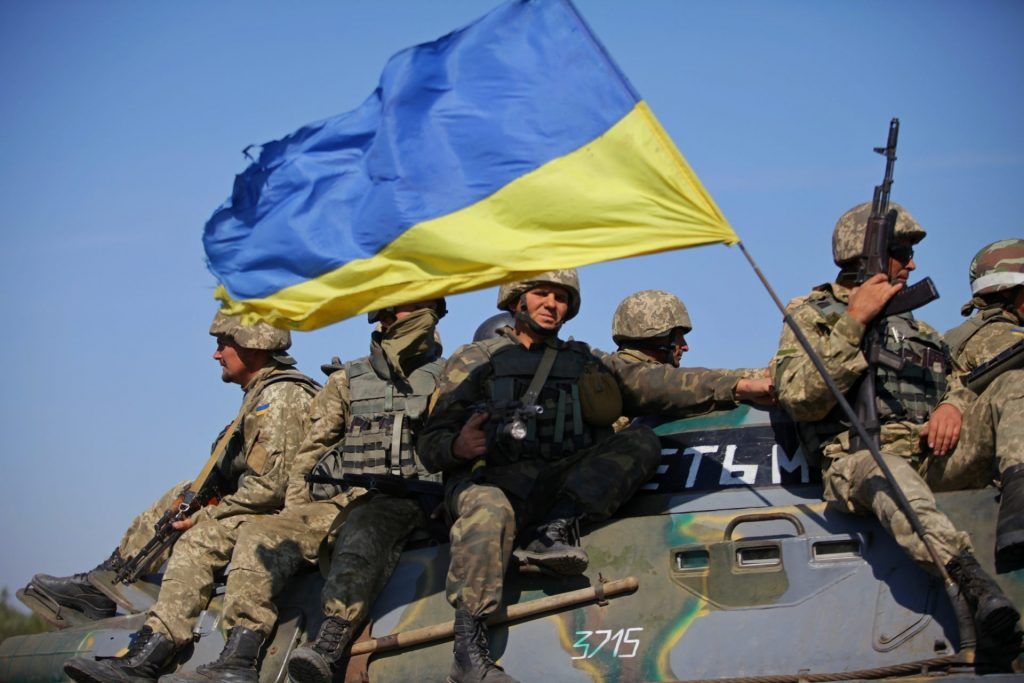Impeachment backstory: The nuclear dimension of US security assistance to Ukraine
By Mariana Budjeryn | November 13, 2019
 Ukrainian troops conduct an operation in eastern Ukraine, 2015. Credit: Ukraine Ministry of Defense
Ukrainian troops conduct an operation in eastern Ukraine, 2015. Credit: Ukraine Ministry of Defense
Ukraine has burst into international headlines as the country at the heart of the impeachment investigation of US President Donald Trump. Earlier this year, President Trump halted nearly $400 million of military aid to Ukraine, which has been battling Russian aggression for over five years at the cost of 13,000 lives. This move might have been used by Trump as leverage to pressure Ukrainian leadership to assist him in undermining his political rival, former Vice President Joe Biden, an allegation the impeachment investigation is set to establish.
In response, Trump retorted that the military aid to Ukraine had been withheld in order to get European countries to step up, because the United States is the only one paying in. That claim has been fact-checked (here, here, and here) and proven wrong. Yet many Americans, for whom Ukraine remains a faraway country about which they know little, may wonder why their tax dollars should be spent on security assistance to this country in the first place.
In fact, there is a very good reason for doing so, with or without the involvement of the Europeans, that Mr. Trump and the American public ought to know. It’s called the Budapest Memorandum, or formally the Memorandum on Security Assurances in Connection with Ukraine’s Accession to the Treaty on the Nonproliferation of Nuclear Weapons. By making its end of the bargain enshrined in the Budapest Memorandum contingent on the president’s whims, the United States is weakening the nonproliferation regime.
The Budapest Memorandum. Concluded in Budapest on December 5, 1994, the memorandum was part of the deal under which Ukraine agreed to surrender the world’s third-largest nuclear arsenal. When the Soviet Union collapsed in 1991, Ukraine inherited more nuclear weapons than China, France, and the United Kingdom combined: 176 intercontinental ballistic missiles and 44 strategic bombers capable of delivering over 2,000 nuclear warheads, as well as over 2,800 tactical nuclear weapons. While Moscow still retained operational control over strategic nuclear weapons, Ukraine also inherited a scientific and military-industrial capacity that would have allowed it to become a fully-fledged nuclear weapons state in a relatively short time.
Ukraine chose to surrender nuclear arms for a number of reasons, not least of which was its desire to be an international citizen in good standing. In return, however, it wanted its security concerns addressed. In particular, Ukraine was wary of Russia, which even under the quasi-democratic leadership of Boris Yeltsin remained reluctant to accept Ukraine’s independent statehood and borders.
Crimea quickly became a problem. An arid peninsula geographically attached to mainland Ukraine, ethnically cleansed of its indigenous Tatar population in 1944 by Josef Stalin, and repopulated with Russians and Ukrainians, Crimea was administratively incorporated into Soviet Ukraine in 1954 by Nikita Khrushchev for political and economic reasons. After the Soviet dissolution, Russia fueled political irredentism in Crimea and, in July 1993, the Russian legislature claimed Russian sovereignty over the Crimean city of Sevastopol, the base of the Soviet Black Sea fleet.
Crimea would remain the Achilles heel of Ukraine’s territorial integrity and a lever of Russian influence. Ukrainian leaders understood that and negotiated hard for security guarantees from all the nuclear powers, although what they essentially wanted was US protection against a potential Russian threat. But the United States was unwilling to extend to Ukraine the kind of security guarantees it extended to its NATO allies, nor would the Clinton administration agree to commit to a legally-binding international treaty because it wanted to avoid dealing with ratification by Congress.
The compromise was a political document, the Budapest Memorandum, in which the United States, the United Kingdom, and Russia, the three depository states of the Nuclear Non-proliferation Treaty (NPT), pledged to respect Ukraine’s territorial integrity and the inviolability of its borders, abstain from economic coercion, and refrain from the threat or use of force—nuclear or otherwise. The memorandum did not specify the assistance Ukraine was to receive if it became a victim of aggression. Ukrainians, however, were led to believe that US would uphold its commitments to their security in the time of need, as Ukraine upheld its commitment to nuclear nonproliferation norms.
The breach. Russia glibly violated the Budapest Memorandum—and a score of other international norms, including legally-binding ones—when it annexed Crimea and invaded Ukraine’s eastern province of Donbas in 2014. The United States then faced a situation in which the check it wrote in 1994 came due. The incumbent Obama administration was more forceful in words than in deeds. It kicked Russia out of the G8, slapped it with some sanctions, and mobilized its European allies to do the same. Obama was reluctant, however, to provide meaningful military assistance to Ukraine, including the release of lethal defensive arms such as the Javelin anti-tank missiles authorized by Congress in 2015, for the fear of escalating the conflict.
To its credit, upon assuming the reins in early 2017, the Trump administration supplied the Javelins and stepped up other security assistance to Ukraine, although by that time the conflict had receded to a stalemate. Neither Obama, nor Trump, however, couched the assistance in terms of security commitments pledged in the Budapest Memorandum.
That’s a shame. Russia’s breach of the memorandum undermines not only Ukraine’s security but the very logic of the nuclear nonproliferation regime. The NPT is inherently discriminatory: it recognizes only five nuclear possessors, which also happen to be the UN Security Council’s permanent five members, yet demands nuclear abstinence from the remainder of the state-parties. The recognition of this exceptional status for the Nuclear Five puts them under a special onus not to abuse this status for their own gain, lest the legitimacy of the bargain at the core of the NPT be eroded.
The NPT, which is approaching its 50th year in force, has been one of the greatest achievements in arms control. It has, however, come under much stress in the past decade. The nuclear possession of Israel, India, and Pakistan outside of the regime has been steadily normalized. Efforts to create a Middle East Nuclear Free Zone, bring the Comprehensive Test Ban Treaty into force, and negotiate a Fissile Material Cut-off Treaty have grounded to a halt. Bilateral US-Russian arms control architecture is crumbling, while the two states that together hold 90 percent of world’s nuclear weapons are pursuing ambitious strategic modernization programs. The rift between the nuclear haves and have-nots has grown as the latter are increasingly frustrated by the inadequate efforts of the former to fulfill their obligations under the Treaty to halt the arms race and conduct negotiations toward total and complete disarmament.
Now Russia, an NPT nuclear-weapons state, has used military force to wage war against Ukraine, a non-nuclear state that had once surrendered the world’s third-largest nuclear arsenal, while the United States, another NPT nuclear-weapons state, makes the assistance it had pledged for just such an eventuality conditional on serving its internal political games. In short, neither nuclear power is upholding its end of the Budapest Memorandum bargain.
None of this bodes well for the nuclear nonproliferation regime. Iran, North Korea, and other aspiring proliferators are taking notes: their leaders will be circumspect when the United States promises economic and security rewards in exchange for greater restrictions on those countries’ nuclear programs. Conversely, providing support to those who do the right thing by denuclearizing would help bolster the salience of the nonproliferation regime and make future nonproliferation efforts more effective. If President Trump indeed intends to make America great (again) he should honor his country’s commitments, without deferring to others.
Together, we make the world safer.
The Bulletin elevates expert voices above the noise. But as an independent nonprofit organization, our operations depend on the support of readers like you. Help us continue to deliver quality journalism that holds leaders accountable. Your support of our work at any level is important. In return, we promise our coverage will be understandable, influential, vigilant, solution-oriented, and fair-minded. Together we can make a difference.
Keywords: Budapest memorandum, Ukraine, United States, impeachment, nonproliferation, security assistance
Topics: Analysis, Nuclear Risk














